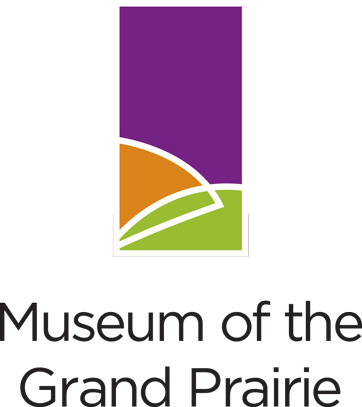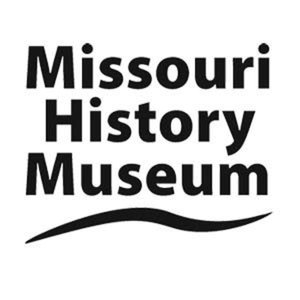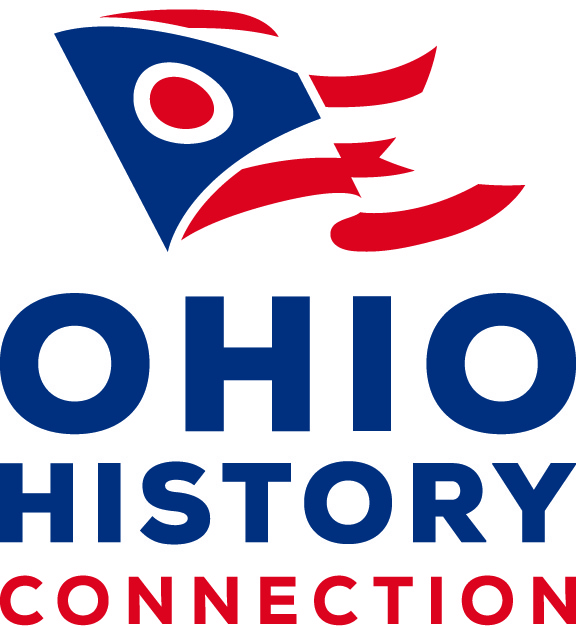from Apr. 15, 1865
Wiggin Diary
-
Full Title
Journal – James Henry Wiggin pt 1
-
Description
Personal journal, on Saturday the 15th the author notes that President Lincoln was assassinated last night in Ford’s Theatre, Washington (New York is crossed out). It also notes that Seward was attacked as well.
-
Source
Tucker Collection care of Museum of the Grand Prairie
-
Rights
Use of this item for research, teaching and private study is permitted with proper citation and attribution to the Museum of the Grand Prairie, Champaign County Forest Preserve District. Reproduction of this item for publication, broadcast, or commercial use requires written permission. For permission please contact Museum of the Grand Prairie, Champaign County Forest Preserve District.
-
Tags
-
Cite this Item
James Henry Wiggin . "Journal – James Henry Wiggin pt 1". Remembering Lincoln. Web. Accessed June 30, 2025. https://rememberinglincoln.fords.org/node/431
from Apr. 15, 1865
Journal – James Henry Wiggin pt 1
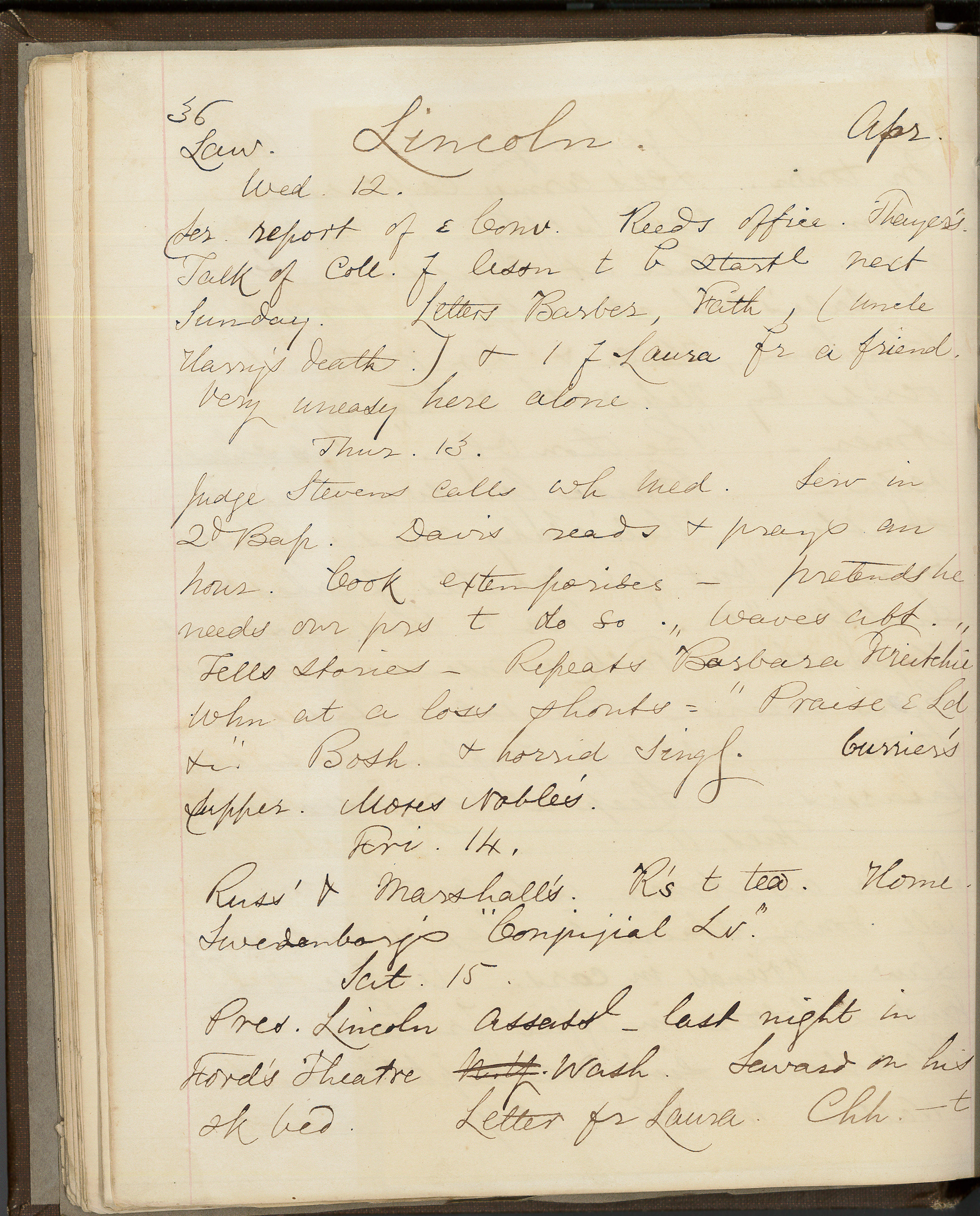
-
Description
Personal journal, on Saturday the 15th the author notes that President Lincoln was assassinated last night in Ford’s Theatre, Washington (New York is crossed out). It also notes that Seward was attacked as well.
-
Source
Tucker Collection care of Museum of the Grand Prairie
-
Rights
Use of this item for research, teaching and private study is permitted with proper citation and attribution to the Museum of the Grand Prairie, Champaign County Forest Preserve District. Reproduction of this item for publication, broadcast, or commercial use requires written permission. For permission please contact Museum of the Grand Prairie, Champaign County Forest Preserve District.
-
Creator
James Henry Wiggin
-
Date
April 15, 1865
from Apr. 15, 1865
President Lincoln Died
-
Full Title
Card – President Lincoln Died
-
Description
Card announcing the death of President Lincoln at 22 minutes past 7.
-
Source
Tucker Collection care of Museum of the Grand Prairie
-
Rights
Use of this item for research, teaching and private study is permitted with proper citation and attribution to the Museum of the Grand Prairie, Champaign County Forest Preserve District. Reproduction of this item for publication, broadcast, or commercial use requires written permission. For permission please contact Museum of the Grand Prairie, Champaign County Forest Preserve District.
-
Tags
-
Cite this Item
Unknown. "Card – President Lincoln Died". Remembering Lincoln. Web. Accessed June 30, 2025. https://rememberinglincoln.fords.org/node/422
from Apr. 15, 1865
Card – President Lincoln Died
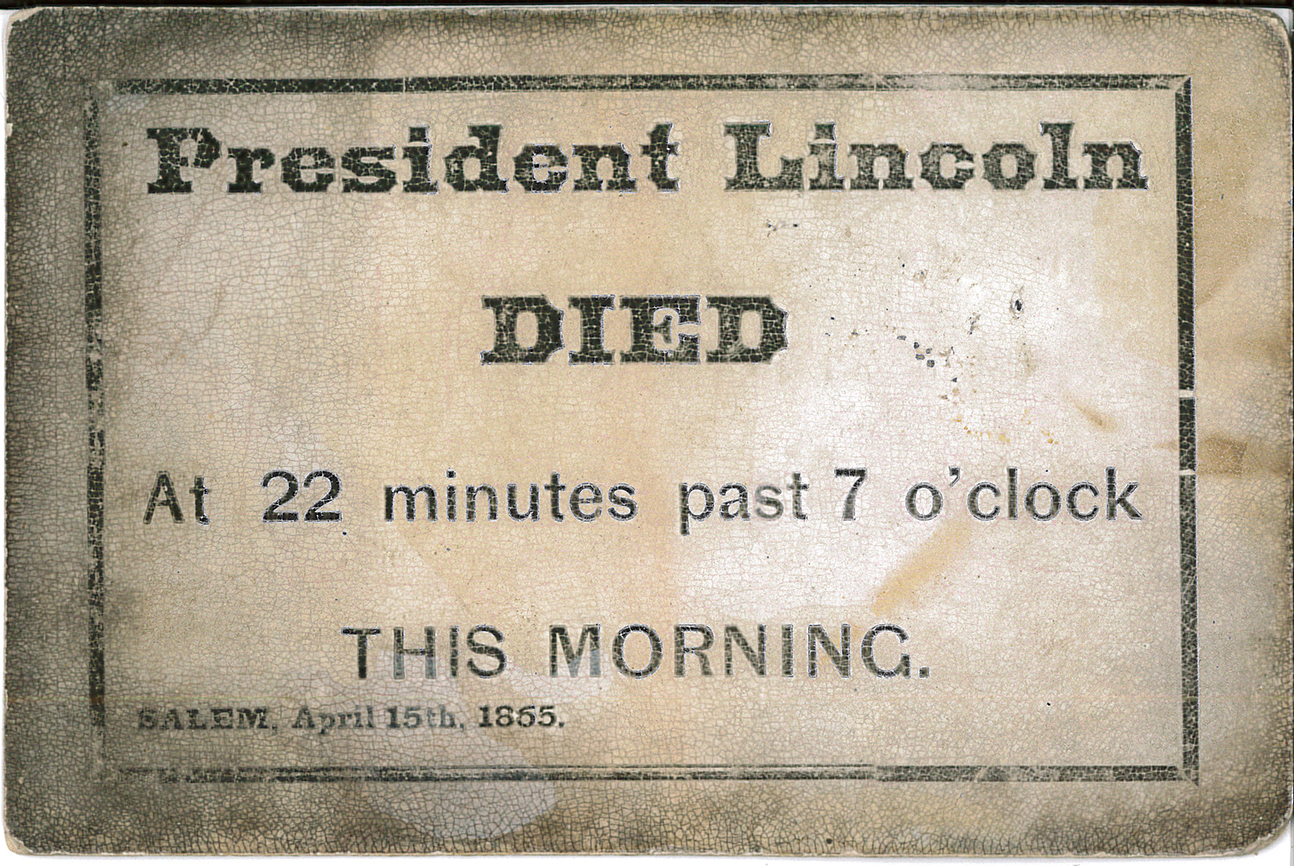
-
Description
Card announcing the death of President Lincoln at 22 minutes past 7.
-
Source
Tucker Collection care of Museum of the Grand Prairie
-
Rights
Use of this item for research, teaching and private study is permitted with proper citation and attribution to the Museum of the Grand Prairie, Champaign County Forest Preserve District. Reproduction of this item for publication, broadcast, or commercial use requires written permission. For permission please contact Museum of the Grand Prairie, Champaign County Forest Preserve District.
-
Creator
Unknown
-
Date
April 15, 1865
from Apr. 15, 1865
Anonymous Diary
-
Full Title
Journal – Friday April 14, 1865, Saturday April 16
-
Description
The journal contains diary entries from Friday, April 14, 1865 to Saturday, April 15, 1865. April 14th notes that Abraham Lincoln was assassinated at 10 o’clock in the evening and that Seward was attacked at the same hour. April 15th notes that the President died at 22 minutes after 7.
-
Source
Tucker Collection care of Museum of the Grand Prairie
-
Rights
Use of this item for research, teaching and private study is permitted with proper citation and attribution to the Museum of the Grand Prairie, Champaign County Forest Preserve District. Reproduction of this item for publication, broadcast, or commercial use requires written permission. For permission please contact Museum of the Grand Prairie, Champaign County Forest Preserve District.
-
Tags
-
Cite this Item
Unknown. "Journal – Friday April 14, 1865, Saturday April 16". Remembering Lincoln. Web. Accessed June 30, 2025. https://rememberinglincoln.fords.org/node/400
from Apr. 15, 1865
Journal – Friday April 14, 1865, Saturday April 16
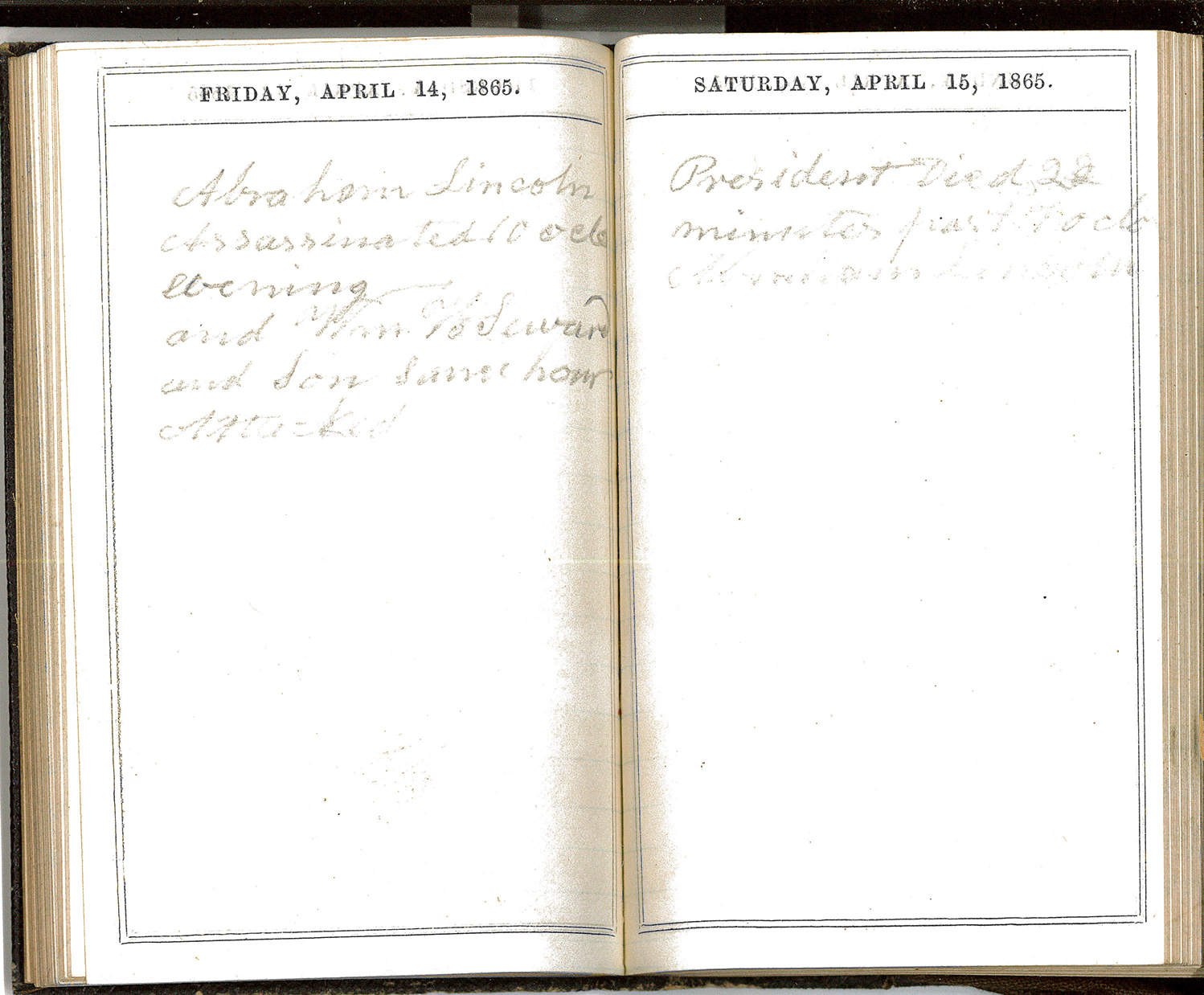
-
Description
The journal contains diary entries from Friday, April 14, 1865 to Saturday, April 15, 1865. April 14th notes that Abraham Lincoln was assassinated at 10 o’clock in the evening and that Seward was attacked at the same hour. April 15th notes that the President died at 22 minutes after 7.
-
Source
Tucker Collection care of Museum of the Grand Prairie
-
Rights
Use of this item for research, teaching and private study is permitted with proper citation and attribution to the Museum of the Grand Prairie, Champaign County Forest Preserve District. Reproduction of this item for publication, broadcast, or commercial use requires written permission. For permission please contact Museum of the Grand Prairie, Champaign County Forest Preserve District.
-
Creator
Unknown
-
Date
April 15, 1865
from Apr. 13, 1865
Anonymous Diary
-
Full Title
Journal – DC Journal Monday April 10 1865
-
Description
The journal contains entries from Thursday, April 13,1865, to Saturday, April 15, 1865, recounting the happenings around the District of Columbia. The author cites the illumination of the city in honor of Union victories. On the 14th it notes that Lincoln was shot and Seward was stabbed. The 15th notes Lincolns death at 7:22.
-
Source
Tucker Collection care of Museum of the Grand Prairie
-
Rights
Use of this item for research, teaching and private study is permitted with proper citation and attribution to the Museum of the Grand Prairie, Champaign County Forest Preserve District. Reproduction of this item for publication, broadcast, or commercial use requires written permission. For permission please contact Museum of the Grand Prairie, Champaign County Forest Preserve District.
-
Tags
-
Cite this Item
Unknown. "Journal – DC Journal Monday April 10 1865". Remembering Lincoln. Web. Accessed June 30, 2025. https://rememberinglincoln.fords.org/node/398
from Apr. 13, 1865
Journal – DC Journal Monday April 10 1865
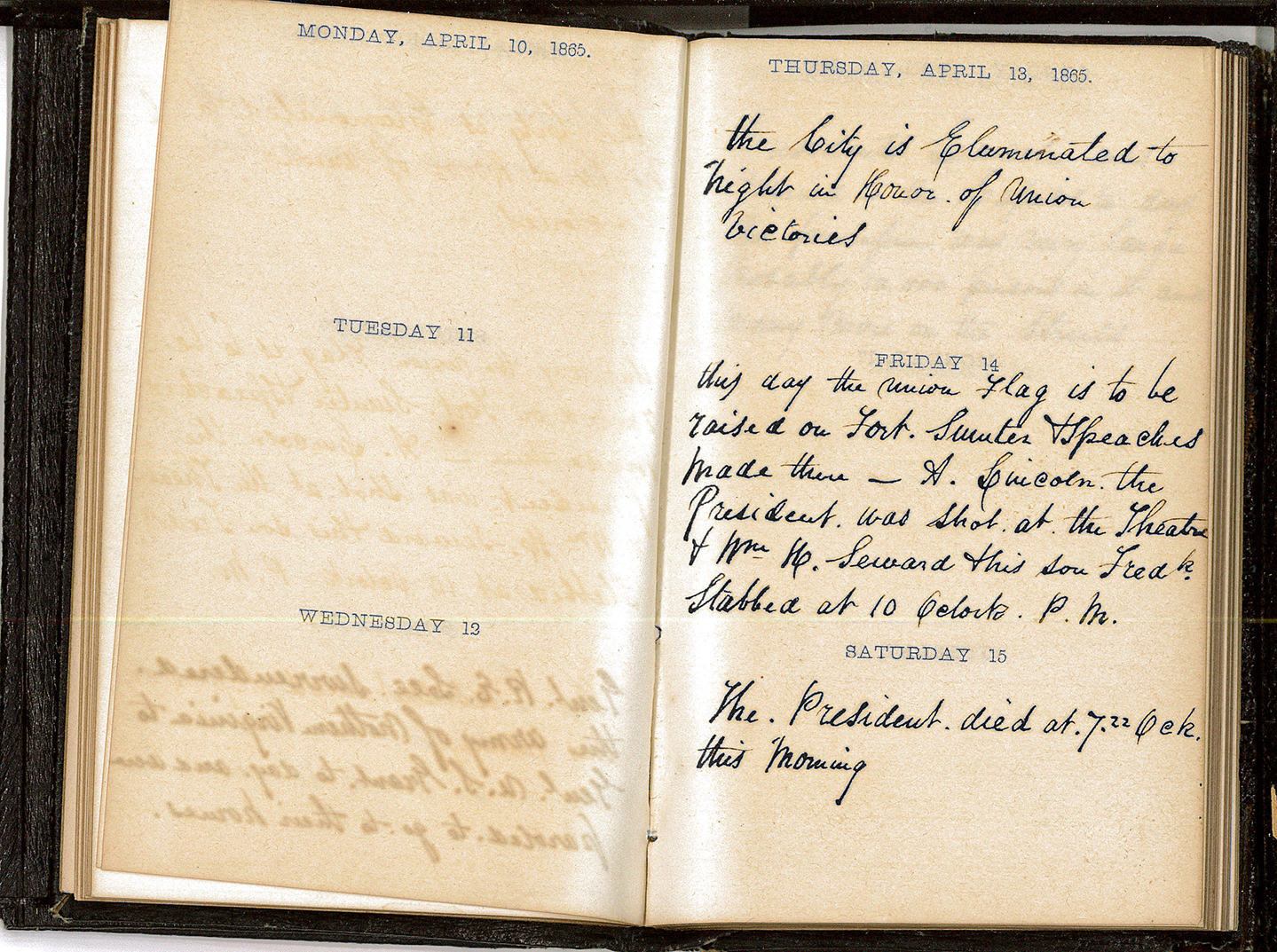
-
Description
The journal contains entries from Thursday, April 13,1865, to Saturday, April 15, 1865, recounting the happenings around the District of Columbia. The author cites the illumination of the city in honor of Union victories. On the 14th it notes that Lincoln was shot and Seward was stabbed. The 15th notes Lincolns death at 7:22.
-
Source
Tucker Collection care of Museum of the Grand Prairie
-
Rights
Use of this item for research, teaching and private study is permitted with proper citation and attribution to the Museum of the Grand Prairie, Champaign County Forest Preserve District. Reproduction of this item for publication, broadcast, or commercial use requires written permission. For permission please contact Museum of the Grand Prairie, Champaign County Forest Preserve District.
-
Creator
Unknown
-
Date
April 13, 1865
from Apr. 16, 1865
Anonymous Diary
-
Full Title
Journal – April Thursday 13 to Sunday 16 1865
-
Description
This diary contains journal entries from Thursday, April 13, 1865, through Sunday , April 16th, 1865. April 15th, the author notes that they heard of the death of the President and “also of Seward”. On the 16th the journalist talks about going to church and the “calamity” that has happened to the Nation.
-
Source
Tucker Collection care of Museum of the Grand Prairie
-
Rights
Use of this item for research, teaching and private study is permitted with proper citation and attribution to the Museum of the Grand Prairie, Champaign County Forest Preserve District. Reproduction of this item for publication, broadcast, or commercial use requires written permission. For permission please contact Museum of the Grand Prairie, Champaign County Forest Preserve District.
-
Tags
-
Cite this Item
Unknown. "Journal – April Thursday 13 to Sunday 16 1865". Remembering Lincoln. Web. Accessed June 30, 2025. https://rememberinglincoln.fords.org/node/397
from Apr. 16, 1865
Journal – April Thursday 13 to Sunday 16 1865
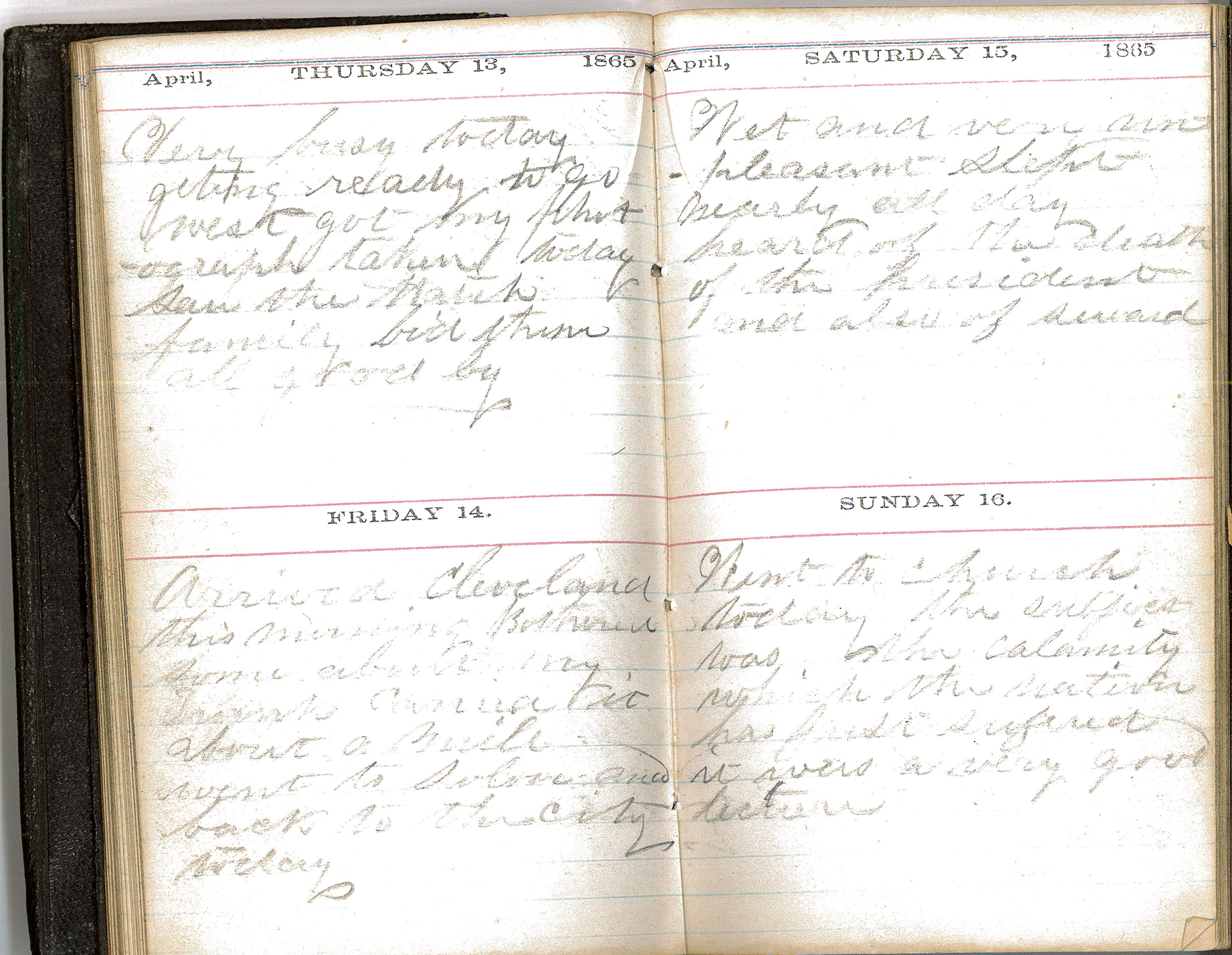
-
Description
This diary contains journal entries from Thursday, April 13, 1865, through Sunday , April 16th, 1865. April 15th, the author notes that they heard of the death of the President and “also of Seward”. On the 16th the journalist talks about going to church and the “calamity” that has happened to the Nation.
-
Source
Tucker Collection care of Museum of the Grand Prairie
-
Rights
Use of this item for research, teaching and private study is permitted with proper citation and attribution to the Museum of the Grand Prairie, Champaign County Forest Preserve District. Reproduction of this item for publication, broadcast, or commercial use requires written permission. For permission please contact Museum of the Grand Prairie, Champaign County Forest Preserve District.
-
Creator
Unknown
-
Date
April 16, 1865
from Apr. 15, 1865
Otis Keene Diary, April 15, 1865
-
Full Title
Otis Keene Diary, April 15, 1865
-
Description
Manuscript item from “Pioneer Days in Florida,” the Otis Keene diary of 1865, April 15 to April 27, which reported the assassination, the funeral procession, the hunt for Booth, etc. Diary, correspondence. These diaries (1863-1894, 1903-1910) contain Keene's often terse entries about his daily routines from 1863, when he resided in Washington, D.C., through his years as a citizen of Jacksonville, Florida. They include his reaction to the assassination of President Abraham Lincoln. Unfortunately, the diaries do not cover the crucial Florida years of 1898 (Spanish-American War) and 1901 (Great Jacksonville Fire) but remain important as a local chronicle.
-
Source
University of Florida
-
Rights
This item is presumed to be in the public domain. The University of Florida George A. Smathers Libraries respect the intellectual property rights of others and do not claim any copyright interest in this item. Users of this work have responsibility for determining copyright status prior to reusing, publishing or reproducing this item for purposes other than what is allowed by fair use or other copyright exemptions. Any reuse of this item in excess of fair use or other copyright exemptions may require permission of the copyright holder. The Smathers Libraries would like to learn more about this item and invite individuals or organizations to contact Digital Services (UFDC@uflib.ufl.edu) with any additional information they can provide.
-
Tags
-
Cite this Item
Keene, Otis L., 1830-. "Otis Keene Diary, April 15, 1865". Remembering Lincoln. Web. Accessed June 30, 2025. https://rememberinglincoln.fords.org/node/373
from Apr. 15, 1865
Otis Keene Diary, April 15, 1865

-
Description
Manuscript item from “Pioneer Days in Florida,” the Otis Keene diary of 1865, April 15 to April 27, which reported the assassination, the funeral procession, the hunt for Booth, etc. Diary, correspondence. These diaries (1863-1894, 1903-1910) contain Keene's often terse entries about his daily routines from 1863, when he resided in Washington, D.C., through his years as a citizen of Jacksonville, Florida. They include his reaction to the assassination of President Abraham Lincoln. Unfortunately, the diaries do not cover the crucial Florida years of 1898 (Spanish-American War) and 1901 (Great Jacksonville Fire) but remain important as a local chronicle.
-
Source
University of Florida
-
Rights
This item is presumed to be in the public domain. The University of Florida George A. Smathers Libraries respect the intellectual property rights of others and do not claim any copyright interest in this item. Users of this work have responsibility for determining copyright status prior to reusing, publishing or reproducing this item for purposes other than what is allowed by fair use or other copyright exemptions. Any reuse of this item in excess of fair use or other copyright exemptions may require permission of the copyright holder. The Smathers Libraries would like to learn more about this item and invite individuals or organizations to contact Digital Services (UFDC@uflib.ufl.edu) with any additional information they can provide.
-
Creator
Keene, Otis L., 1830-
-
Date
April 15, 1865
-
Material
Diary
from May. 4, 1865
E. Rothesay Miller to Theodore Freeley Gale
-
Full Title
Letter of E. Rothesay Miller, "The Monastery," Princeton, to Free [Theodore Freeley Gale], May 4, 1865
-
Description
Regarding his education at Princeton and Abraham Lincoln's body passing through Philadelphia after the assassination. States, ". . . .I was at home for about a week's vacation at the time that our President's body was taken through Philadelphia. I went down Friday afternoon: there was to have been a grand illumination — procession on Monday. The first thing that I heard Saturday Morning before I was dressed was that Lincoln had been murdered. It could hardly be believed. I expected to go see the body Sunday afternoon but my brother — Mr. Hall. . . .started right after breakfast — after three hours hard work got as far as 6th — Chestnut (It was in the State House on Chestnut below 5th.) They were on the corner for an hour — then concluded that they might as well give up. The crowd was so dense that the crystal of my brother's watch was broken (a heavy hunting case). He said every once in a while some woman would faint — she would be passed out over the heads of the crowd. . . ."
-
Source
Missouri History Museum
-
Rights
This item is in the public domain.
-
Tags
-
Cite this Item
Miller, Edward Rothesay. "Letter of E. Rothesay Miller, "The Monastery," Princeton, to Free [Theodore Freeley Gale], May 4, 1865". Remembering Lincoln. Web. Accessed June 30, 2025. https://rememberinglincoln.fords.org/node/311
from May. 4, 1865
Letter of E. Rothesay Miller, "The Monastery," Princeton, to Free [Theodore Freeley Gale], May 4, 1865
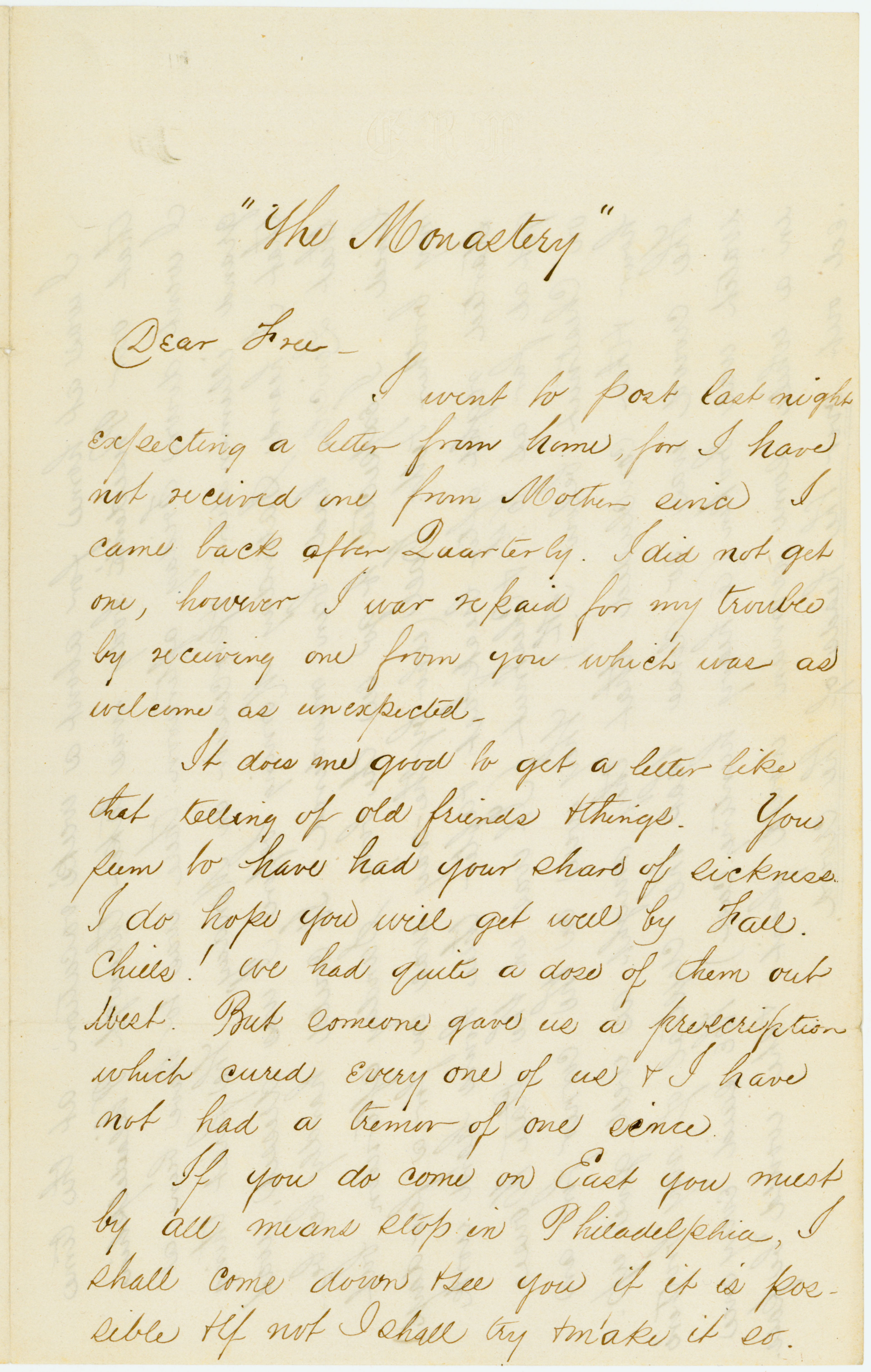
-
Description
Regarding his education at Princeton and Abraham Lincoln's body passing through Philadelphia after the assassination. States, ". . . .I was at home for about a week's vacation at the time that our President's body was taken through Philadelphia. I went down Friday afternoon: there was to have been a grand illumination — procession on Monday. The first thing that I heard Saturday Morning before I was dressed was that Lincoln had been murdered. It could hardly be believed. I expected to go see the body Sunday afternoon but my brother — Mr. Hall. . . .started right after breakfast — after three hours hard work got as far as 6th — Chestnut (It was in the State House on Chestnut below 5th.) They were on the corner for an hour — then concluded that they might as well give up. The crowd was so dense that the crystal of my brother's watch was broken (a heavy hunting case). He said every once in a while some woman would faint — she would be passed out over the heads of the crowd. . . ."
-
Source
Missouri History Museum
-
Rights
This item is in the public domain.
-
Creator
Miller, Edward Rothesay
-
Date
May 4, 1865
from Apr. 19, 1865
Jud M. Bemis to Jenny
-
Full Title
Letter of Jud M. Bemis, St. Louis, to his sister Jenny, April 19, 1865
-
Description
Mentions the death of President Lincoln and the local church services to remember him in St. Louis.
-
Transcription
St. Louis, April 19th, 1865
Dear Sister Jenny,
Your kind letter of Feb 19th to
hand several days since. I wrote Steph last
Saturday the day our noble President expired -
having been shot the night previous - what a
horrible crime. Could any person that would -
commit such a deed have any human blood
in his veins? Was he born of woman or devil?
Lincoln our noble President a second Washington -
in the heart of the American people and -
equal to him as a Statesmen, Patriot and
a Christian, is no more as I write this -
Beth our taking and [?] firing his death
[?] this being his funeral day. Business is
suspended. There are services in all the -
churches doing honor to the [?] dead -
may he rest in peace. [?] may his guardian
spirit watch over the destinies of [?] our
beloved country in this hour of its greatest
period is my [?] prayer -
I am glad to hear
Tammy is getting along so fairly. Do you think she
She will be as strong as though nothing had
ever [?] her? I hope so. I believe I wrote
Steph that Nate and Molly had lost one of
their children. that with Nate’s financials -
troubles must make them feel pretty badly.
Jenny you [?] [?] it
was as my wedding tour. [?] Jenny it was not.
If I ever [?] a wedding tour it will
be to California and that within two years -
Well I guess you will say that I [?] right
to the point - so I am - I know about all of
your love matters. So I will tell you about all of
mine. Well Jenny to [?]. I will say that I am
in love for the first time. Yes for the first time -
I introduced myself to the young lady that I have
chosen for my wife (if I can get her) about
three months ago - you may think it’s strange that
I should introduce myself - when in Boston I was
requested to call on a Boston lady stopping here when I return
home which I agreed to do - I was acquainted
with the gentleman she was stopping with him. He
not being at home when I called - of course I
[?] myself. do not believe in love at first sight
but that or something the under me say as I left
Miss Alice Logswell that evening that I’m thankful for -
[Transcription by: Megan Klein, Rachel Engl's class, Lehigh University.] -
Source
Missouri History Museum
-
Rights
This item is in the public domain.
-
Tags
-
Cite this Item
Bemis, Judson Moss, 1833-1921. "Letter of Jud M. Bemis, St. Louis, to his sister Jenny, April 19, 1865". Remembering Lincoln. Web. Accessed June 30, 2025. https://rememberinglincoln.fords.org/node/307
from Apr. 19, 1865
Letter of Jud M. Bemis, St. Louis, to his sister Jenny, April 19, 1865
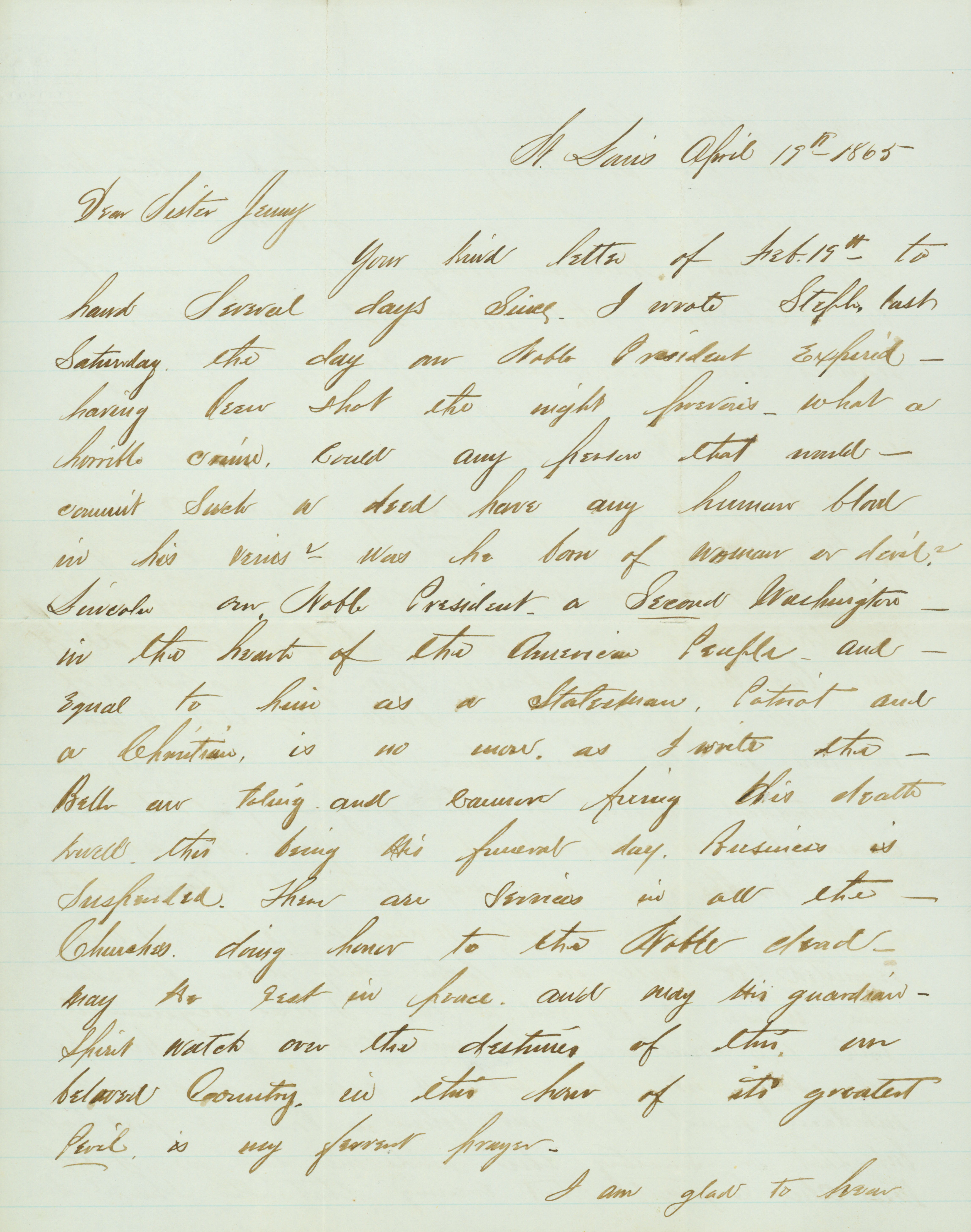
-
Description
Mentions the death of President Lincoln and the local church services to remember him in St. Louis.
-
Source
Missouri History Museum
-
Rights
This item is in the public domain.
-
Creator
Bemis, Judson Moss, 1833-1921
-
Date
April 19, 1865
from Apr. 16, 1865
Nathan D. Allen Diary
-
Full Title
Nathan D. Allen diary, 1834-1888
-
Description
Nathan D. Allen was born May 15, 1819, at Watkins Glen, New York, and came to St. Louis in 1837, eventually settling in Webster Groves, St. Louis County, Missouri, where he died May 9, 1903. The diary of Nathan D. Allen contains material on life in Webster Groves, with accounts of the 1849 cholera epidemic and the Civil War in St. Louis, and mentions meeting Abraham Lincoln and Henry Shaw. (Additional information on Allen family was added later by donor.)
-
Source
Missouri History Museum
-
Rights
This item is in the public domain.
-
Tags
-
Cite this Item
Allen, Nathan D., 1819-1903. "Nathan D. Allen diary, 1834-1888". Remembering Lincoln. Web. Accessed June 30, 2025. https://rememberinglincoln.fords.org/node/305
from Apr. 16, 1865
Nathan D. Allen diary, 1834-1888
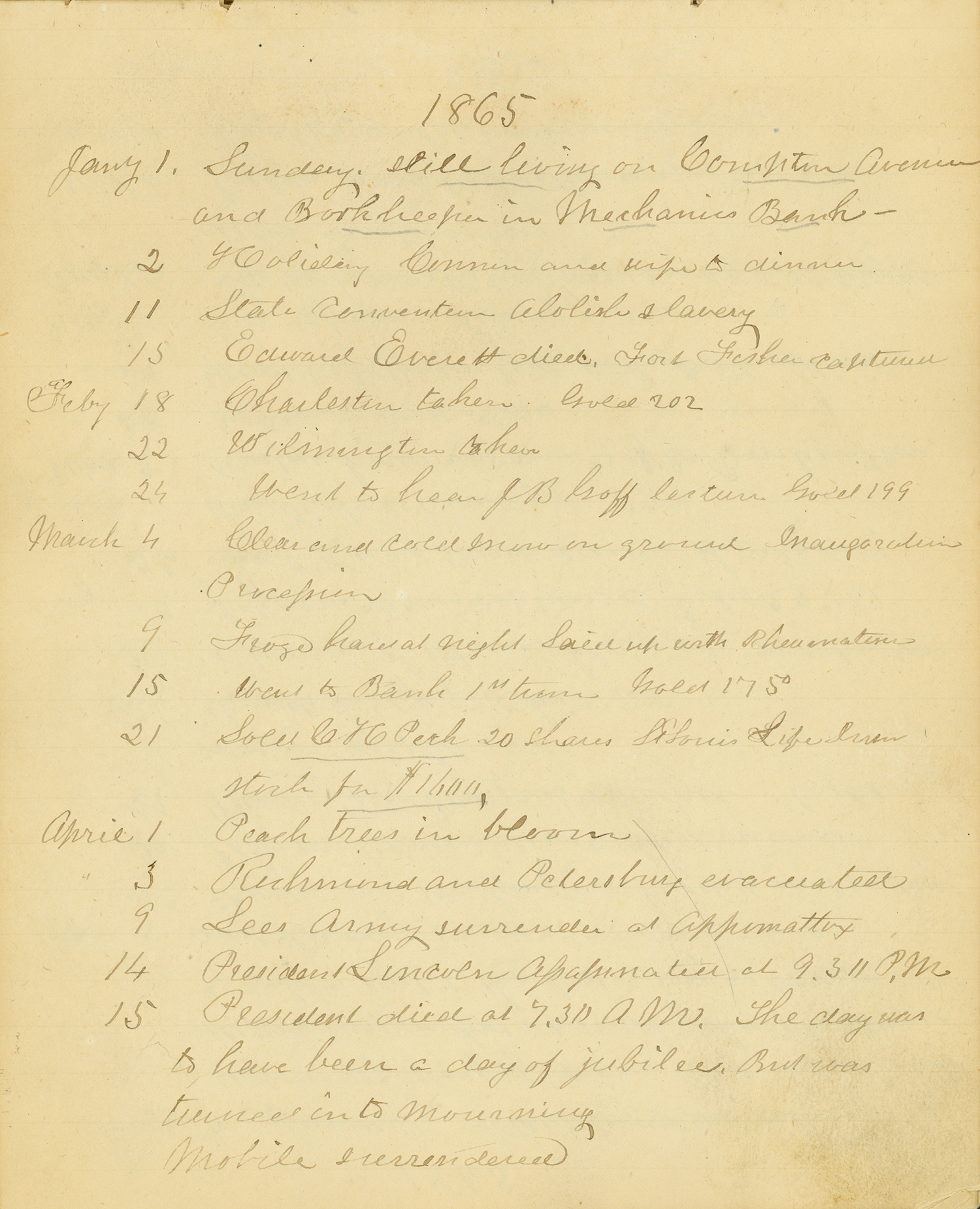
-
Description
Nathan D. Allen was born May 15, 1819, at Watkins Glen, New York, and came to St. Louis in 1837, eventually settling in Webster Groves, St. Louis County, Missouri, where he died May 9, 1903. The diary of Nathan D. Allen contains material on life in Webster Groves, with accounts of the 1849 cholera epidemic and the Civil War in St. Louis, and mentions meeting Abraham Lincoln and Henry Shaw. (Additional information on Allen family was added later by donor.)
-
Source
Missouri History Museum
-
Rights
This item is in the public domain.
-
Creator
Allen, Nathan D., 1819-1903
-
Date
April 16, 1865
from Jan. 1, 1907
Alice Strickler Keyes diary entry
-
Full Title
Alice Strickler Keyes diary entry
-
Description
Alice Strickler Keyes eyewitness account of the day that Lincoln’s funeral train stopped in Columbus, Ohio, on its way to Springfield, Illinois, where the remains of the president and those of his son Willie would be buried. This account is an excerpt from the Alice Strickler Keyes diary passage in the Altrurian Club of Columbus, Ohio President's Book.
-
Transcription
[Page 1]
25
These grounds, at the head of State street, it was so far from the town and in such a swampy and unimproved district, that it too was dubbed “Swayne’s Folly.” Noah Swayne became most widely known as Justice of the Supreme Court of the United States.
His home at the head of State street was later occupied by J. Ewing Miller. Its site is now that of the Carnegie Library.
Before the “Insane Asylum” burned, the terminus of all our walks eastward, was the great flat boulder, that still lies on the sidewalk in the east Broad street, east of Jefferson Avenue.
A little farther east the Asylum Grounds ended, and not far beyond, lay “Riley’s Woods,” and the open country.
In April, 1865, Columbus with the rest of The Nation was celebrating the “Fall of Fort Sumpter,” the surrender of General Lee, and the End of the “Civil War.” There was great rejoicing.
April 14th was appointed by Governor Brough as a day of thanksgiving. On that day there were services in the churches in the morning;—in the afternoon
[Page 2]
26
and evening everything was done that is possible on such occasions to express the joy of the citizens. The town was lavishly decorated.
The next morning, April 15th all this joy was turned to sorrow when the news of President Lincoln’s assassination reached the city. The emblems of Victory gave place to those of mourning for the fallen Chief.
It was learned a few days later, that the funeral train on its way to Springfield, Illinois, would stop in Columbus, and that the body of the President would lie in state for one day, in the Rotunda of the Capitol.
At school we were told that the city Fire Department would be in the procession to meet the train at the station, and that a number of young girls, dressed in deep mourning were wanted—one to stand beside each driver on the fire engines, and many others to ride on the large “Hook and Ladder” wagon, reconstructed for the occasion.
[Page 3]
27
This plan was carried out. Forty-two school girls of varying ages, of whom I was one, rode on this car, massed around one of our teachers (Miss Sarah Smith) who was heavily draped in black and represented “Columbia.”
After the coffin of President Lincoln was placed on the splendid funeral car, the procession started back on its route through the streets of the city.
At intervals the black robed girls on the float, led by their teacher, sang verses from dirge-like hymns.
When the procession stopped at the gate of the Capitol, these girls left their float and were led into the building, and past the coffin of the President. It is said over fifty thousand people viewed “the remains” that day.
The catalogue used to carry the body of President Lincoln had a canopy shaped like a pagoda. It was large, covered with black cloth, festooned, and trimmed with silver fringe. It was drawn by six white horses with large black plumes on their heads. The horses had a covering of black cloth edged with silver fringe, and each horse was led by a groom dressed in black.
[Page 4]
28
The silver fringe used to trim the funeral car of President Lincoln in Columbus, was afterward turned over to women of one of the church societies, to make into souvenirs to be sold, and I was able to secure a piece of it.
The historian of the “Altrurian Club” (Mrs. Cope) has asked for a small portion of the fringe to be attached to this record of my recollections, and I am happy to give this tiny, precious relic to “Altrurian Club,” of which I am a charter member, and through all the years of its existence, without a break, a constant and loyal member.
Alice S. Keyes
(Mrs. Elias A. Keyes.)
[piece of silver fringe attached]
[Transcription by McCaela Michas]
-
Source
-
Rights
Use of this item for research, teaching, and private study is permitted with proper citation and attribution, as Courtesy of the Ohio History Connection, Abraham Lincoln Presidential Collection . Reproduction of this item for publication, broadcast, or commercial use requires written permission. For permission, please see this web page.
-
Tags
-
Cite this Item
Keyes, Alice Strickler. "Alice Strickler Keyes diary entry". Remembering Lincoln. Web. Accessed June 30, 2025. https://rememberinglincoln.fords.org/node/282
from Jan. 1, 1907
Alice Strickler Keyes diary entry
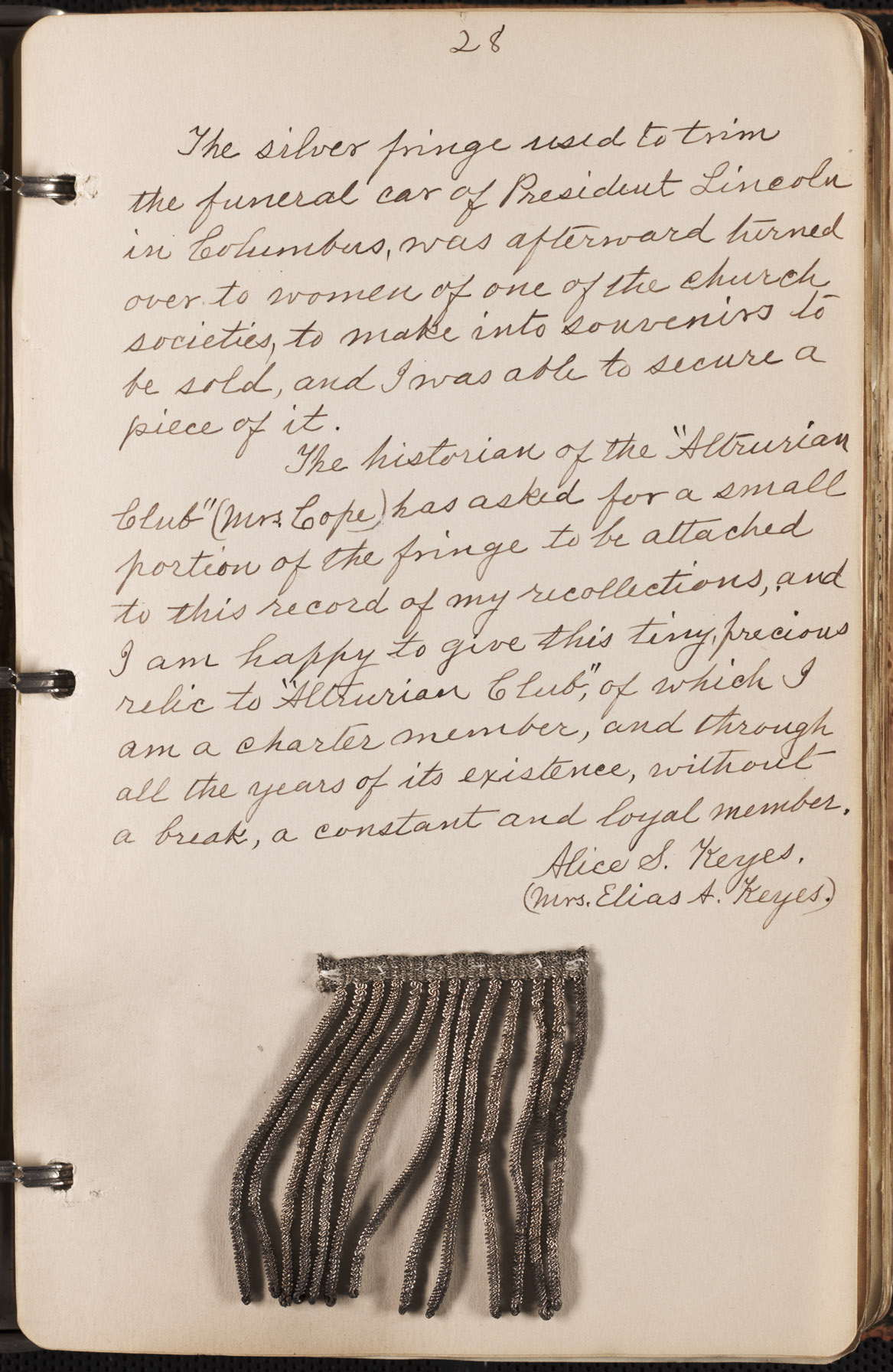
-
Description
Alice Strickler Keyes eyewitness account of the day that Lincoln’s funeral train stopped in Columbus, Ohio, on its way to Springfield, Illinois, where the remains of the president and those of his son Willie would be buried. This account is an excerpt from the Alice Strickler Keyes diary passage in the Altrurian Club of Columbus, Ohio President's Book.
-
Source
-
Rights
Use of this item for research, teaching, and private study is permitted with proper citation and attribution, as Courtesy of the Ohio History Connection, Abraham Lincoln Presidential Collection . Reproduction of this item for publication, broadcast, or commercial use requires written permission. For permission, please see this web page.
-
Creator
Keyes, Alice Strickler
-
Date
January 1, 1907
